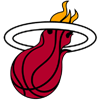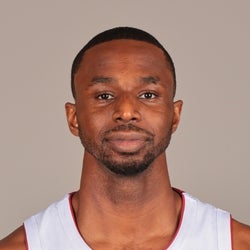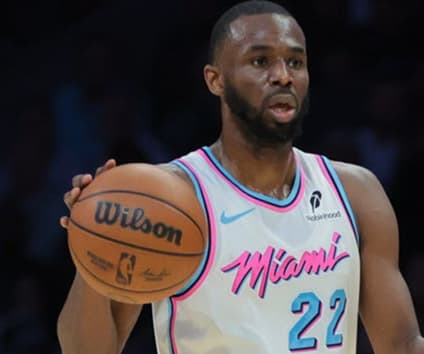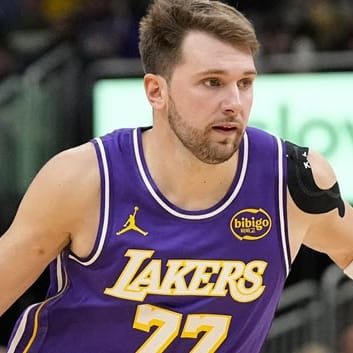Probable
Injury Hamstring
Est. Return 1/25/2026
2025 Stats
PTS
15.9
REB
4.9
AST
2.9
STL
1.2
BLK
1.0
ROS Projections
2025 Fantasy Outlook
The 2024 No. 1 overall pick never lived up to the hype, but Wiggins has still had a strong NBA career. During the 2022-23 season with the Warriors, the Kansas product was named an All-Star and won an NBA title. He's been a consistent secondary option, which has usually yielded solid fantasy results - nine top-125 finishes in eight-category leagues. Wiggins found his shooting stroke in Golden State. After shooting 33.2 percent from deep in his first six seasons, the veteran has shot 38.1 percent over the last five campaigns. He's also been somewhat durable, playing over 70 regular-season games eight times in 11 years. Wiggins was a significant part of Miami's haul for Jimmy Butler last season. The former was a seamless fit and played well in his limited action, averaging 19.0 points, 4.2 rebounds, 3.3 assists, 1.2 steals and 1.0 blocks in 32.1 minutes per game across 17 regular-season appearances. The Heat weren't done changing their roster in the post-Butler era, losing Duncan Robinson and Haywood Highsmith this offseason while adding Norman Powell, Kasparas Jakucionis and Simone Fontecchio. Youngsters Pelle Larsson, Keshad Johnson, Jaime Jaquez and Nikola Jovic are also still around and pushing for playing time, but it would take major regression for Wiggins to lose his spot in the offensive pecking order behind Tyler Herro, who miss the start of the campaign after undergoing surgery on his foot, and Bam Adebayo. Wiggins doesn't have top-50 upside, but he is a safe selection after pick 100. Read Past Outlooks

Nursing minor hamstring injury
Wiggins is listed as probable for Sunday's game against the Suns due to left hamstring tightness.
ANALYSIS
The probable tag indicates that the injury isn't considered a serious issue and that Wiggins should play in Sunday's contest. The veteran wing has averaged 14.6 points, 5.1 rebounds, 2.7 assists, 1.9 threes and 1.2 steals over 29.4 minutes per game since the start of January.
The probable tag indicates that the injury isn't considered a serious issue and that Wiggins should play in Sunday's contest. The veteran wing has averaged 14.6 points, 5.1 rebounds, 2.7 assists, 1.9 threes and 1.2 steals over 29.4 minutes per game since the start of January.
NBA Per Game Stats
Per Game
Total
Per 36
NBA Per Game Stats
Loading Per Game Stats...
2025 NBA Game Log
2025
2024
2023
2022
2021
2020
2019
2018
2017
2016
2025 NBA Per Game Split Stats
Schedule
By Month
Starting/Off Bench
Days Rest
Vs Opp
By Result
2025 NBA Per Game Split Stats
Loading Split Stats...
Advanced Stats
Loading Advanced Stats...
Stat Review
2025
2024
2023
2022
2021
2020
2019
2018
2017
2016
How does Andrew Wiggins compare to other players?
This section compares his stats with all players from the previous three seasons (minimum 200 minutes played)*. The bar represents the player's percentile rank. For example, if the bar is halfway across, then the player falls into the 50th percentile for that stat and it would be considered average.
True Shooting %
57.0%
Effective Field Goal %
54.5%
3-Point Attempt Rate
37.0%
Free Throw Rate
17.5%
Offensive Rebound %
5.9%
Defensive Rebound %
10.4%
Total Rebound %
8.1%
Assist %
12.9%
Steal %
1.5%
Block %
2.8%
Turnover %
9.3%
Usage %
20.1%
Fantasy Points Per Game
30.9
Fantasy Points Per Minute
1.0
NBA Historical Fantasy Stats
Historical ADP
Loading Historical ADP...
Heat Depth Chart
Our full team depth charts are reserved for RotoWire subscribers.
Subscribe Now
Heat Rotation: Minutes Breakdown
Loading Heat Rotation Data...
Average Fantasy Points
Minutes
FanDuel
DraftKings
Yahoo
FantasyDraft
Head2Head
Sorare
Average Fantasy Points are determined when Andrew Wiggins was active vs. non-active during the season. Click here to view average fantasy points for a different time period.
Loading Average Minutes...
Past Fantasy Outlooks
2024
2023
2022
2021
2020
2019
2018
2017
2016
2015
2014
Wiggins never averaged fewer than 16.9 points in any year until last season, posting a career-worst 13.2 points per game. Such a massive drop-off is hard to understand, with Wiggins averaging 13.2 points, 4.5 rebounds, 1.7 assists, 0.6 steals, 0.6 blocks and 1.3 threes per game. That's a guy who doesn't even need to be rostered in fantasy, and it's hard to understand why he fell off so hard. The minute total dipping to 27 minutes is part of it but taking just 11 shots a game is the biggest culprit. To make things even messier for Wiggins, Golden State decided to revamp its rotation. The Warriors added De'Anthony Melton, Buddy Hield and Kyle Anderson while parting ways with Klay Thompson. That means there are way more minutes and shot attempts coming in than leaving, and we have to assume Wiggins will have another tough season in this muddled rotation. A former top pick who's never finished below 17 points should be in line for a bounce-back season, but there's not much in Wiggins' favor when looking at all the variables.
More Fantasy News

Steady campaign continues
Wiggins racked up 18 points (6-14 FG, 2-7 3Pt, 4-4 FT), five rebounds and one assist over 27 minutes during Monday's 135-112 loss to Golden State.
ANALYSIS
Subscribe now to instantly reveal our take on this news.
Subscribe now to instantly reveal our take on this news.

Drills season-high seven threes
Wiggins closed with 23 points (8-16 FG, 7-10 3Pt), five rebounds, three assists, one block and two steals in 37 minutes during Sunday's 124-112 loss to the Thunder.
ANALYSIS
Subscribe now to instantly reveal our take on this news.
Subscribe now to instantly reveal our take on this news.

Quiet night in loss
Wiggins finished Tuesday's 122-94 loss to the Timberwolves with 10 points (3-10 FG, 2-3 3Pt, 2-2 FT), four rebounds, two assists, two blocks and one steal over 26 minutes.
ANALYSIS
Subscribe now to instantly reveal our take on this news.
Subscribe now to instantly reveal our take on this news.

Chips in 12 points in loss
Wiggins finished with 12 points (4-12 FG, 2-7 3Pt, 2-2 FT), two rebounds, three assists and two steals across 28 minutes before fouling out of Saturday's 125-115 loss to the Timberwolves.
ANALYSIS
Subscribe now to instantly reveal our take on this news.
Subscribe now to instantly reveal our take on this news.

Tallies six stocks in Monday's win
Wiggins registered 19 points (6-10 FG, 4-7 3Pt, 3-4 FT), six assists, five rebounds, three steals and three blocks over 31 minutes during the Heat's 147-123 win over the Nuggets on Monday.
ANALYSIS
Subscribe now to instantly reveal our take on this news.
Subscribe now to instantly reveal our take on this news.
Latest Fantasy Rumors

Linked to Golden State
The Warriors are expected to explore a trade framework that would send Jonathan Kuminga to Miami in a potential swap involving Wiggins, according to NBA reporter Marc Stein.
ANALYSIS
Any movement here would signal the Warriors prioritizing immediate reliability over future growth, as Wiggins would be a clear win-now upgrade. With Jimmy Butler lost for the season with a torn ACL, it looks like the team is still intent on bringing in outside help to extend Stephen Curry's title window.
Any movement here would signal the Warriors prioritizing immediate reliability over future growth, as Wiggins would be a clear win-now upgrade. With Jimmy Butler lost for the season with a torn ACL, it looks like the team is still intent on bringing in outside help to extend Stephen Curry's title window.















